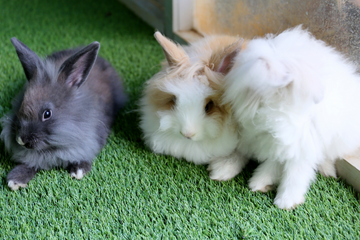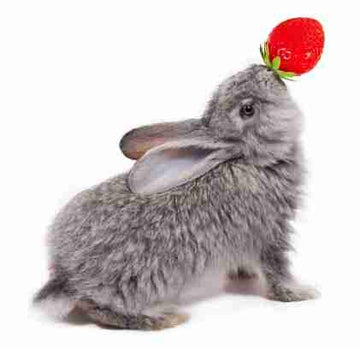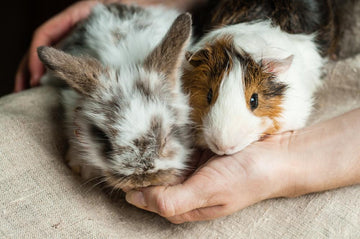Care During the Different Life Stages of Rabbits
Rabbits are fascinating creatures whose care varies significantly throughout the different stages of their lives. From their early, vulnerable days as blind and hairless newborns to their later years as affectionate companions, understanding these stages is crucial for providing the best environment for your pet. Dive into our comprehensive guide to learn about each phase of a rabbit's life and ensure your furry friend thrives from birth to old age.

Newborn Rabbits
When rabbits are born it is not uncommon for them to nurse from the mother rabbit for only a couple minutes throughout the day. Did you know baby rabbits are born blind, deaf, and without hair? It’s true!
2-4 Weeks Old
Rabbits start to open their eyes and discover the world around them by about two weeks of age. Because these rabbits are still babies, they will still rely on their mother’s milk for the majority of their food. Often, Alfalfa Hay is introduced to rabbits around three weeks old but their diet should not consist solely of this type of hay; pellets are also recommended for a healthy diet.
4-6 Weeks Old
By this age, rabbits will be more aware of their surroundings. They will start growing more hair on their bodies and they will start drinking water, weaning themselves from their mothers, and eating more Alfalfa Hay. Alfalfa Hay is important rabbit food because it helps younger rabbits gain weight and it provides them with nutrients that they cannot get from their mother. Rabbits should not be sold before six weeks of age. By the time they reach six weeks old, they will be fully independent from their mother and should be able to survive and mature on their own. Knowing these facts is essential for rabbit care and providing a good environment for your animal.
Adolescence
3-6 Months Old
By the time male rabbits reach 3-4 months old, they are said to have reached sexual maturity. The same is true for female rabbits around 5-6 months old. During this time it is important to get your rabbit spayed or neutered because male rabbits are known to court female rabbits by spraying urine and female rabbits are known to lunge or growl at people; they also tend to be very territorial. Spaying or neutering your rabbit will help with these tendencies.
Teenagers
6 Months-1 Year Old
At around 7 months old, your rabbit should be introduced to Timothy Hay and you should start limiting the amount of Alfalfa Hay you are feeding your rabbit. Timothy hay provides your rabbit with nutrients that it needs to stay healthy and unlike alfalfa hay, it will not make your rabbit gain weight. During this time in your rabbit’s life, your rabbit will become fully mature and he or she might be a little moody. This is the time in your rabbit’s life when they are trying to figure out how they fit in with the surrounding animals, much like a teenager might be figuring out where they fit in with their group of friends.
Young Adulthood
1-3 Years Old
At this time in a rabbit’s life, it is very common that he or she will spend much of their time exercising and roaming around the house. Make sure you keep your bunny safe by rabbit-proofing your house!
Middle Age
3-5 Years Old
Rabbits tend to become a little less active by the time they reach this age. It is said that rabbits also become more affectionate during this period and they will start to trust you more.
Late Middle Age
5-7 Years Old
During this time in your rabbit’s life, it is very common that you might notice your rabbit having problems keeping themselves clean. Make sure you check with the veterinarian from time to time to ensure you are doing everything you can to keep your bunny happy and healthy.
Old Age (How Long Do Bunnies Live?)
7 Years Old And Above
While some rabbits tend to still be very active at this age, it isn’t uncommon to notice your rabbit calming down quite a bit. At this age, rabbits tend to really trust their owners and they like to spend a good amount of time around people. It is said the older rabbits get, the more time they want to spend with people. Make sure to keep up with your rabbit care and ensure that you are spending some quality time with your rabbit in order to keep it as happy and healthy as you can.
Got a little one under 7 months? Let us help you get started by downloading our Human's Guide to Feeding Baby Bunnies! Everything you need to know in order to keep them growing happy and healthy no matter if Momma Rabbit is attentive or not.

Fun and Unique Names for Rabbits

Healthy Rabbit Treats for Hoppy Pets






![RHDV2 Critical Information + Frequently Asked Questions [Updated 03/20/2025]](http://www.rabbitholehay.com/cdn/shop/articles/rhdv2-critical-information-frequently-asked-questions-V1.png?v=1742490107&width=360)

